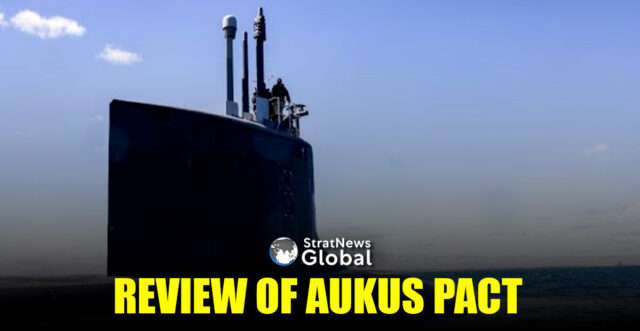An adviser to former U.S. President Joe Biden, defended the AUKUS pact on Monday, cautioning against its cancellation as the Pentagon reviews the project to supply Australia with nuclear-powered submarines.
The adviser acknowledged, however, that the initiative faces significant hurdles that must be addressed for it to move forward successfully.
In a joint paper authored with a former State Department official, Abraham Denmark recognized the need for “a thorough review of AUKUS by the Trump administration.”
But he added: “Should AUKUS fail or be scrapped, the United States would become less capable in the Indo-Pacific … its international credibility would be dramatically undercut, deterrence would be undermined, and propaganda from Beijing and Moscow declaring the unreliability of American commitments would gain significant credibility.”
The paper, written for Washington’s Center for the Strategic and International Studies think tank, listed well-known problems that need to be addressed, including lagging U.S. submarine production rates and the question of whether Australia would use submarines supplied by the U.S. in an Indo-Pacific conflict while depleting U.S. resources in acquiring them.
Issues To Be Addressed
The report also highlighted the high costs of AUKUS – it is estimated it will cost Australia $240 billion (A$368 billion) over more than 30 years – a shortage of skilled labor for submarine production in all three countries, and other practical issues such as a lack of progress in ensuring “AUKUS visas” to facilitate movement for people involved in the project.
It also pointed at a vague focus of the so-called Pillar Two of AUKUS aimed at collaboration in high-tech weaponry and said this needs to be narrowed.
The report, which Denmark co-authored with Charles Edel, a former State Department official now also at CSIS, said despite the issues, “shoring up AUKUS” was a “strategic imperative.”
It said AUKUS would “boost the United States’ defence industrial base, strengthen its closest allies, send a powerful deterrent message to Beijing, and help stabilize the (Indo-Pacific) region.”
Details of the AUKUS plan to provide Australia with nuclear-powered attack submarines from the early 2030s were unveiled in 2023 under former President Joe Biden, part of efforts to counter China’s ambitions in the Indo-Pacific.
The Pentagon has said a review it announced in June of the three-way collaboration between Australia, Britain and the United States to ensure it aligns with President Donald Trump’s “America First agenda” will be completed in the autumn.
The review has been led by Elbridge Colby, the Pentagon’s under secretary of defence for policy, who has previously expressed concern the U.S. would lose submarines to Australia at a critical time for deterrence against China.
Last month, the Republican and Democratic heads of a U.S. congressional committee for strategic competition with China stressed their strong support for AUKUS.
(With inputs from Reuters)





